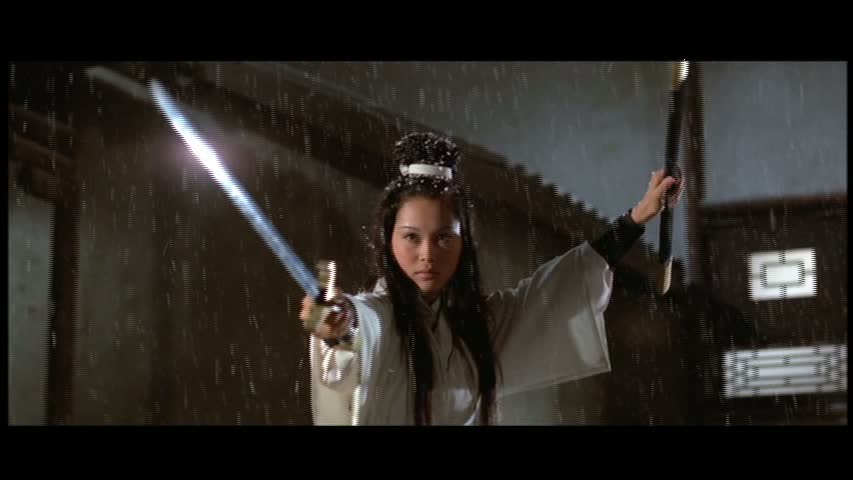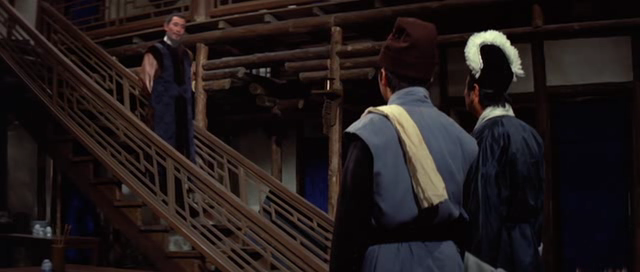Written by Yip Yat-Fong
Directed by Teddy Yip Wing-Cho
Hong Kong, 1972
Sometimes, it’s best for filmmakers to toss all their eggs into one basket, to throw everything into their picture save the kitchen sink, to go out all guns blazing. When the opportunity presents itself to make something really out of the ordinary or, at the very least, a bit off-kilter when juxtaposed against the legion of competing pictures, why forsake that chance? If the final product fails to connect with viewers, the creative team may nevertheless take solace in the fact that they showed an iota of courage in avoiding complacency. Indeed, history carries with it a number of examples of extravagantly idiosyncratic productions that failed to resonate in any shape or form, Richard Kelly’s Southland Tales being an oft-cited one. In the Shaw Brothers catalogue, the sheer volume of films that more or less resemble one another is incalculable. Director Teddy Yip Wing-Cho was nowhere near as prolific as some of his better known Hong Kong brethren of the era, yet his 1972 film The Black Tavern stands as one of the more unique, fresh films ever made by the studio.
Providing a plot synopsis for Yip’s movie whilst holding back on some fundamental plot details is a little bit tricky given how the story takes the road less travelled, even though at its core the plot is simple. Some cursory elements shall be divulged in the current paragraph, with more in-depth details shared further in the review. In a nutshell, the film has a series of heroes and hoodlums, all operating under secrecy against each other and sometimes collaboratively, head to a famous inn in the dead of winter. The reason for everyone’s sudden interest in this lonely haven in the middle of nowhere is the rumour of a soon-to-be retired official, Hai Gangfeng, travelling along those roads, carrying with him a case of jewels he accepted as bribes. Some characters concoct plans to intercept Hai at the inn and rob him of his riches whereas others aspire to more virtuous intentions. Let the deadly games begin…
It feels appropriate to get the obvious, immediate sensations out of the way first. The Black Tavern is unequivocally one of the coolest, zaniest, thrilling, better-directed Shaw Brothers films in the studio’s catalogue. Similar to the majority of their output, The Black Tavern is considerably dark in terms of violence, with characters being offed in outrageously violent ways that are certain to tickle fans’ fancy. That said, where Yip’s film sets itself apart from the fray is in how it handles the humongous number of characters involved in the attempted heist or preservation of Hai Gangfeng’s retirement insurance. The movie is gushing with a sense of creative fun, from the way characters look, the setting, the battle sequences, the turn of events, the costumes, the makeup; it simply looks, sounds, and feels unique amongst the countless number of kung fu flicks set in ancient China. Is it bloody and gory? Absolutely, but terribly fun as well.
For starters, consider the fact that what sets all of the heroes and villains in motion is a beggar monk (Dean Shek Tin) who sings of his experiences while travelling the lands in search for shelter and provisions. All the characters the viewers are to see later on at various stages are dining in a restaurant when in walks this filthy monk who sings about Hai Gangfeng’s bounty he inconspicuously noticed the previous night while trying to sleep on a tree branch. Better still, the same monk returns later, sharing yet another song describing his woeful life, therefore making The Black Tavern a semi-musical in that respect. How does this make the plot any better? It probably doesn’t (it is admittedly bewildering that everyone in the region prone to committing theft is having dinner at the same restaurant, just by happenstance), but it does make the cinematic as a whole much more original and engaging.
The filmmakers exercise inventiveness in large and small ways. Sometimes, it is merely details that add to the film’s richness. There are only so many of these stories set during wintertime, a detail that may not seem as if it would alter very much. Yip utilizes the seasonal choice to the full extent, visually and tonally. The panoramic canvas shots evoke a barren, unwelcoming mood while the final third transpires during heavy snowfall. Whenever an attacker is killed outside, his or her corpse is increasingly hidden from view by the flurry as time elapses. In another scene, a rider appears in the distance atop a hill, a lone, dark figure in a pale vista bleached of its summer time hues. The freezing temperatures can be felt as if the viewer was travelling along with these fantastical personalities in an unforgiving, hollow land. The cold temperature also results in a diverse range of costume designs, with much of the winter attire shining with rich primary colours.
Then there are the characters. In this regard, The Black Tavern excels at deviating just a little bit from the norm, surprising the viewers at several turns. The owners of the titular inn are presented as conniving fools in over their heads as they prepare to host Hai Gangfeng. Adding to the mood is the inexplicable decision to prepare their buns with human flesh. Out of the blue, The Black Tavern becomes a precursor to The Texas Chain Saw Massacre. Once again, this is not something that carries tremendous influence over the story itself, only adding to the peculiar identity the filmmakers are trying to construct. From that point onward, all of the faces met in the opening scene with the singing monk eventually make an appearance. The cast is quite impressive too, with Shih Szu, Tung Li, Ku Feng, Kong Ling, Liu Wai and Yeung Chi-Hing all making appearances in some capacity, either for good or evil. One mute character arrives wearing a helmet adorned with Viking-type horns. A trio of mercenaries is named the Three Headed Cobra, even though their individual handles represent animals such as leopards and bears. Five men with white makeup smeared all over their faces and wearing black hooded robes form the Five Ghosts of Xiang Xi; at one point, a character literally believes them to be zombies. The Whipmaster, a villain whose weapon of choice should come as no surprise to anyone, can decapitate people by lassoing his whip around their necks and tightening the noose. Finally, there is one female vigilante (Shih Szu) whose real identity, revealed late in the film, ties into another classic Shaw film, The Lady Hermit.
The Black Tavern is definitely over the top, even by Shaw standards. In no way does that detract from the experience, however. Instead, it can only add to it. The filmmakers clearly had tremendous fun putting as many spins on what can happen in a movie dominated by a single location. The Black Tavern is absolutely worth visiting at least once; just be mindful of what is on the menu.
— Edgar Chaput




